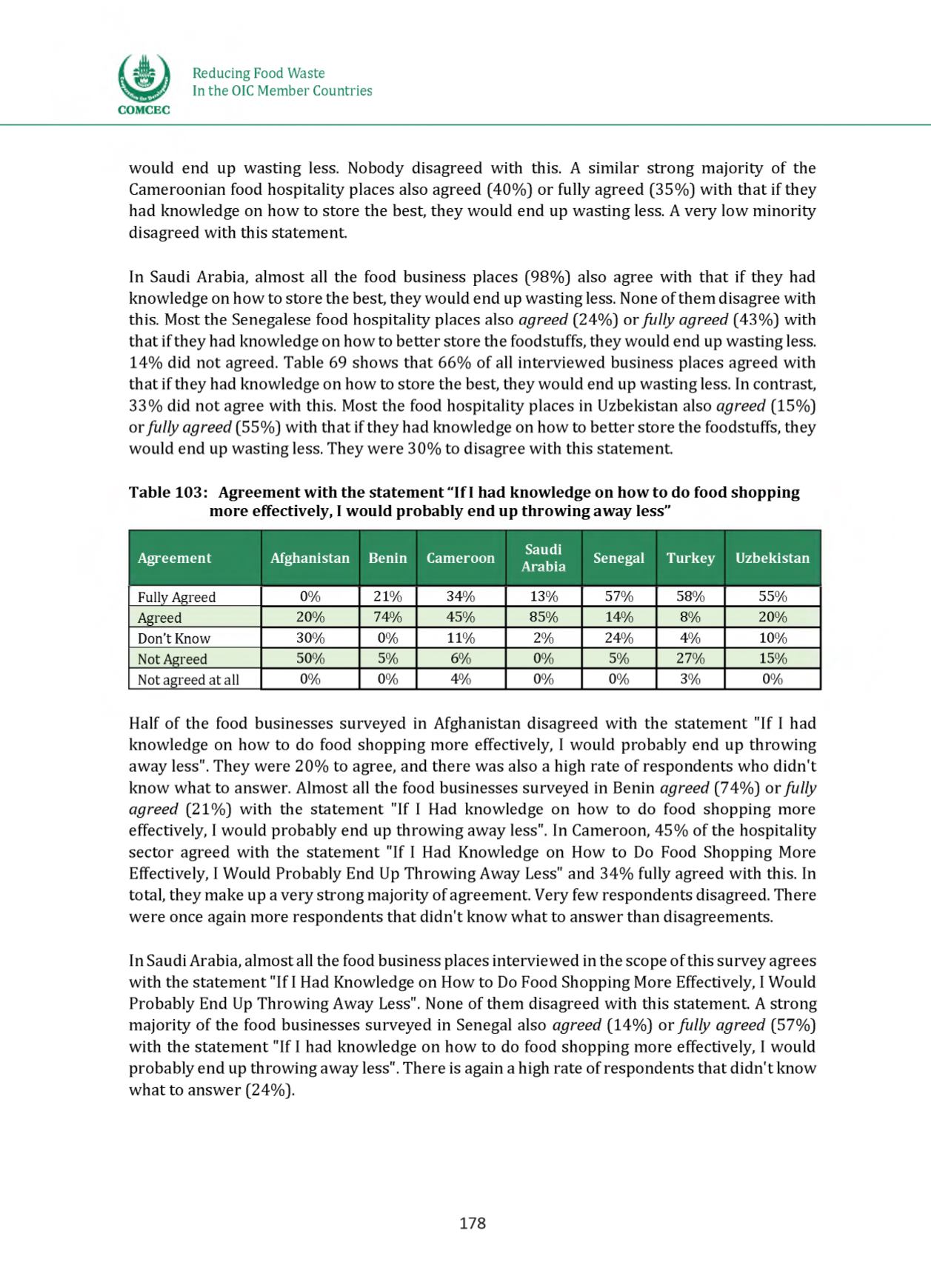

Reducing Food Waste
In the OIC Member Countries
COMCEC
w ou ld end up wasting less. Nobody disagreed w ith this. A sim ilar strong m ajority of the
Cameroonian food hospitality places also agreed (40% ) or fully agreed (35% ) w ith tha t if they
had know ledge on h ow to store the best, they w ou ld end up w asting less. A very low m ino rity
disagreed w ith this statement.
In Saudi Arabia, alm ost all the food business places (98% ) also agree w ith tha t if they had
know ledge on h ow to store the best, they w ou ld end up wasting less. None of them disagree w ith
this. Most the Senegalese food hospitality places also
agreed
(24% ) or
fully agreed
(43% ) w ith
tha t if they had know ledge on h ow to better store the foodstuffs, they w ou ld end up wasting less.
14% did no t agreed. Table 69 shows tha t 66% of all interviewed business places agreed w ith
tha t if they had know ledge on how to store the best, they w o u ld end up wasting less. In contrast,
33% did n o t agree w ith this. Most the food hospitality places in Uzbekistan also
agreed
(15% )
or
fully agreed
(55% ) w ith tha t if they had know ledge on how to better store the foodstuffs, they
w ou ld end up wasting less. They were 30% to disagree w ith this statement.
Table 103: Agreement with the statement "If I had knowledge on how to do food shopping
more effectively, I would probably end up throwing away less”
Agreement
Afghanistan Benin Cameroon Saudi
Arabia Senegal
Turkey Uzbekistan
Fully Agreed
0% 21% 34%
13% 57% 58%
55%
Agreed
20% 74% 45%
85% 14% 8%
20%
Don’t Know
30% 0% 11%
2% 24% 4%
10%
Not Agreed
50% 5% 6%
0%
5% 27%
15%
Not agreed at all
0%
0% 4%
0%
0% 3%
0%
H alf of the food businesses surveyed in A fghanistan disagreed w ith the statement " If I had
know ledge on how to do food shopp ing more effectively, I w ou ld probab ly end up throw ing
away less". They were 20% to agree, and there was also a high rate of respondents who d id n 't
know w h a t to answer. A lm ost all the food businesses surveyed in Benin
agreed
(74% ) or
fully
agreed
(21% ) w ith the statement "If I Had know ledge on how to do food shopp ing more
effectively, I w o u ld probab ly end up throw ing away less". In Cameroon, 45% of the hospitality
sector agreed w ith the statement "If I Had Knowledge on How to Do Food Shopping More
Effectively, I W o u ld Probably End Up Throw ing Away Less" and 34% fully agreed w ith this. In
total, they make up a very strong majority of agreement. Very few respondents disagreed. There
were once again more respondents tha t d id n 't know w h a t to answer than disagreements.
In Saudi Arabia, alm ost all the food business places interviewed in the scope o f this survey agrees
w ith the statement "If I Had Knowledge on How to Do Food Shopping More Effectively, I W ou ld
Probably End Up Throw ing Away Less". None of them disagreed w ith this statement. A strong
m ajority of the food businesses surveyed in Senegal also
agreed
(14% ) or
fully agreed
(57% )
w ith the statement "If I had know ledge on h ow to do food shopp ing more effectively, I w ould
probab ly end up throw ing away less". There is again a high rate of respondents tha t d id n 't know
w h a t to answer (24% ).
178
















